Individualism is the moral stance, political philosophy, ideology and social outlook that emphasizes the intrinsic worth of the individual. Individualists promote realizing one's goals and desires, valuing independence and self-reliance, and advocating that the interests of the individual should gain precedence over the state or a social group, while opposing external interference upon one's own interests by society or institutions such as the government. Individualism makes the individual its focus, and so starts "with the fundamental premise that the human individual is of primary importance in the struggle for liberation".

Ralph Waldo Emerson, who went by his middle name Waldo, was an American essayist, lecturer, philosopher, abolitionist, and poet who led the Transcendentalist movement of the mid-19th century. He was seen as a champion of individualism and critical thinking, as well as a prescient critic of the countervailing pressures of society and conformity. Friedrich Nietzsche thought he was "the most gifted of the Americans", and Walt Whitman called him his "master".
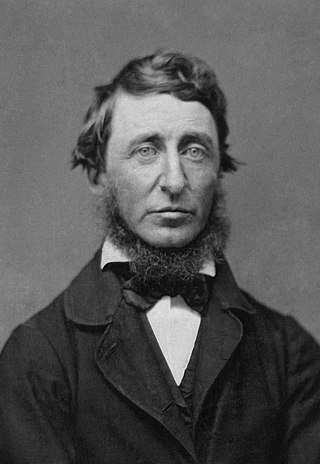
Henry David Thoreau was an American naturalist, essayist, poet, and philosopher. A leading transcendentalist, he is best known for his book Walden, a reflection upon simple living in natural surroundings, and his essay "Civil Disobedience", an argument in favor of citizen disobedience against an unjust state.

Self-help or self-improvement is a self-directed improvement of oneself—economically, physically, intellectually, or emotionally—often with a substantial psychological basis.
Analytic philosophy is a broad, contemporary movement or tradition within Western philosophy and especially anglophone philosophy focused on analysis.
Transcendentalism is a philosophical, spiritual, and literary movement that developed in the late 1820s and 1830s in the New England region of the United States. A core belief is in the inherent goodness of people and nature, and while society and its institutions have corrupted the purity of the individual, people are at their best when truly "self-reliant" and independent. Transcendentalists saw divine experience inherent in the everyday, rather than believing in a distant heaven. Transcendentalists saw physical and spiritual phenomena as part of dynamic processes rather than discrete entities.

Stanley Louis Cavell was an American philosopher. He was the Walter M. Cabot Professor of Aesthetics and the General Theory of Value at Harvard University. He worked in the fields of ethics, aesthetics, and ordinary language philosophy. As an interpreter, he produced influential works on Wittgenstein, Austin, Emerson, Thoreau, and Heidegger. His work is characterized by its conversational tone and frequent literary references.

Francis Otto Matthiessen was an educator, scholar and literary critic influential in the fields of American literature and American studies. His best known work, American Renaissance: Art and Expression in the Age of Emerson and Whitman, celebrated the achievements of several 19th-century American authors and had a profound impact on a generation of scholars. It also established American Renaissance as the common term to refer to American literature of the mid-nineteenth century. Matthiessen was known for his support of liberal causes and progressive politics. His contributions to the Harvard University community have been memorialized in several ways, including an endowed visiting professorship.

Henry Nelson Goodman was an American philosopher, known for his work on counterfactuals, mereology, the problem of induction, irrealism, and aesthetics.

Heikki Johannes Kovalainen is a Finnish racing driver competing in the Japan Rally Championship for Rally Team AICELLO. He raced in Formula One between 2007 and 2013 for the Renault, McLaren, Team Lotus, Caterham and Lotus F1 teams, scoring a single victory at the 2008 Hungarian Grand Prix. After leaving Formula One, he raced in the Japanese Super GT series between 2015 and 2021, where he won the championship in 2016.
Irwin Edman was an American philosopher and professor of philosophy.
Traditionalist conservatism, often known as classical conservatism, is a political and social philosophy that emphasizes the importance of transcendent moral principles, manifested through certain posited natural laws to which it is claimed society should adhere. It is one of many different forms of conservatism. Traditionalist conservatism, as known today, is based on Edmund Burke's political views as well as the views of Joseph de Maistre. Traditionalists value social ties and the preservation of ancestral institutions above what they perceive as excessive individualism. One of the first uses of the phrase "conservatism" began around 1818 with a monarchist newspaper named "Le Conservateur", written by Francois Rene de Chateaubriand with the help of Louis de Bonald.

James Giles is a Canadian philosopher and psychologist. He has written about the philosophy of perception, personal identity and the self, mindfulness, Buddhist and Taoist philosophy, and has published theories of the evolution of human hairlessness, the nature of sexual desire, sexual attraction, and gender. His wide range of academic interests and often controversial views have earned him the title of an "interdisciplinary maverick."
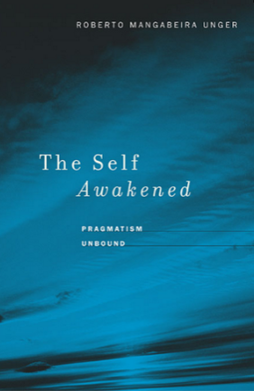
The Self Awakened: Pragmatism Unbound is a 2007 book by philosopher and politician Roberto Mangabeira Unger. In the book, Unger sets forth a theory of human nature, a philosophical view of time, nature and reality, and a proposal for changes to social and political institutions so that they best nourish the context-transcending quality that Unger sees at the core of human existence. Written in a prophetic and poetic manner that drew comparison with the work of Whitman and Emerson, and delving into issues of humankind's existential predicament in a manner that one critic found evocative of Sartre, The Self Awakened also serves as a summation of many of the core principles of Unger's work.

Communitas: Means of Livelihood and Ways of Life is a 1947 book on community and city planning by Percival and Paul Goodman. Presented as an illustrated primer on how city planning affects socioeconomic order and citizens' empowerment to better their communities, the book reviews historical and modern approaches to urban planning before proposing three of the Goodmans' own provocative community paradigms.
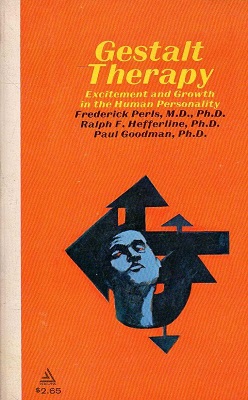
Gestalt Therapy is a 1951 book that outlines an extension to psychotherapy, known as gestalt therapy, written by Fritz Perls, Ralph Hefferline, and Paul Goodman. Presented in two parts, the first introduces psychotherapeutic self-help exercises, and the second presents a theory of personality development and growth.
Taylor Stoehr (1931–2013) was an American professor and author. He edited several volumes of Paul Goodman's work as his literary executor.
Russell Marcus is a philosopher specializing in philosophy of mathematics and the pedagogy of philosophy. He is Chair of Philosophy at Hamilton College and president of the American Association of Philosophy Teachers.
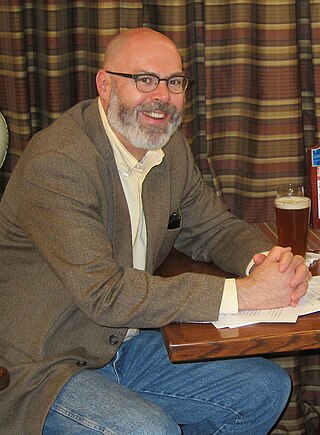
John T. Lysaker is an American philosopher and William R. Kenan Professor of Philosophy at Emory University. He is known for his works on ethics, aesthetics and philosophical psychology.
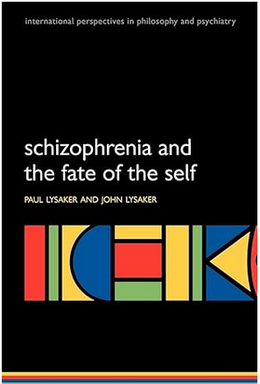
Schizophrenia and the Fate of the Self is a 2008 book by Paul Lysaker and John Lysaker, in which the authors discuss the philosophical and psychiatric aspects of schizophrenia.













